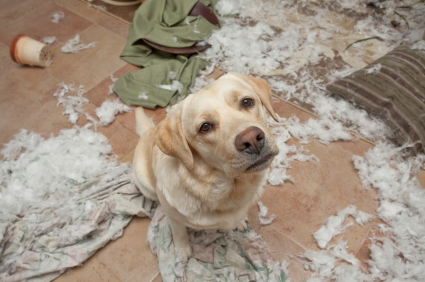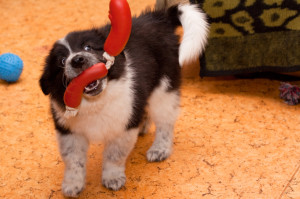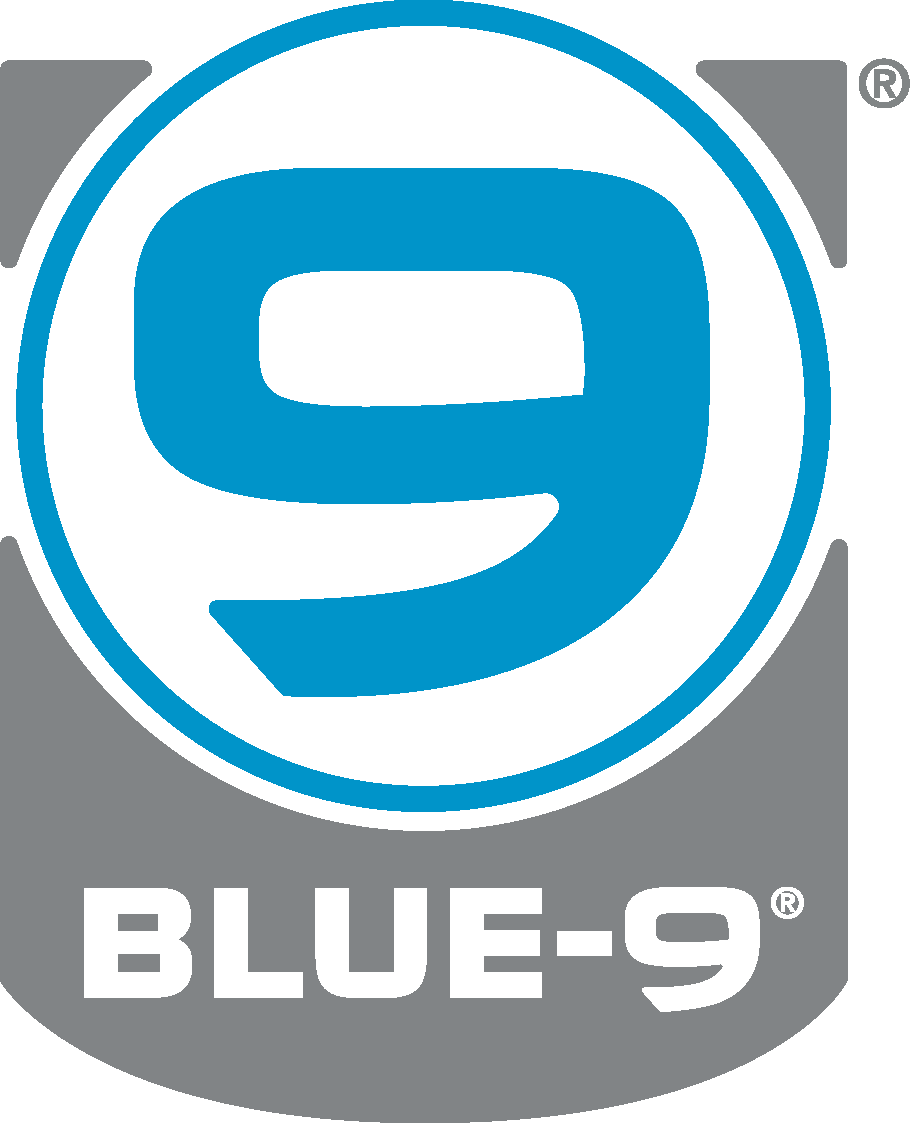Timing is Everything
Be a Leader Even a Puppy can Follow!

What can you say to the dog at this point? Nothing useful, unfortunately.
Have you ever left the room for a few minutes and then came back to discover a stinky, unwelcome house training mistake left by your pup? Or how about one of your favorite belongings chewed to shreds? “Grrrrrr – ROVER, what did YOU DO!?!?!?” Wait – bite your tongue.
One of the biggest mistakes dog owners commonly make is trying to teach their pup well AFTER a behavior has already occurred. This is most often seen when owners walk into a room and discover the evidence – but not the action. They scold the dog by pointing at the mess and yelling (or some other form of unpleasantness). It’s clear from the dog’s body language that he is aware something is wrong. But, is he actually learning anything from this? No! Or rather, if he is, it’s not what you want him to be learning. He is learning that you are one (or all) of the following:
- scary
- confusing
- unpredictable
This hurts your bond, and can easily make the behavior worse. When you make a dog scared or stressed the dog is now more likely to avoid you, plus now he needs an outlet to relieve that stress. In other words, you’re creating the perfect recipe for more destructive behavior – that happens out of your sight.

When your pup chooses the right toy – reward him with a game of tug or fetch!
The only way a dog can ever understand your feedback is during an action or immediately after that action takes place. Even 3 seconds after a behavior is too late! Dogs don’t have the ability to understand past tense language. This is why good trainers and experienced dog owners always supervise young dogs – so they can be there to TEACH them with instant feedback. If a puppy grabs a shoe instead of a toy, you interrupt the behavior immediately and then provide a toy instead that you let the pup keep. Give great rewards to a puppy when he gets his own toy rather than choosing a shoe in the first place! For example, praise excitedly and engage in a fun game with the toy as a reward for making a good choice. In the future, the pup will choose that toy again.
Remember to set your dog up to win. Don’t leave shoes around if your pup doesn’t know the difference yet. In the case of house training, always make sure the pup’s tank is empty. Once you’ve set your dog up to win by managing his environment or his schedule, then supervision = success. If you’re there to interrupt unwanted behavior and reward good behavior – your dog will catch on quick! If you’re going to leave your dog unsupervised, you might as well have a wild animal. But, if you’re there to teach all the time when he’s young, once he knows the rules, then you can relax your constant supervision. Now, you’ve earned the right to take a break – you don’t always have to be there to explain the rules anymore. Be patient – with a pup, this period of supervision and teaching takes months – with a newly adopted adult dog it may only take a few weeks. Either way, it’s worth it – this is how you raise a great dog!
~
Want to become a dog trainer with great timing? Our national courses are designed to make you a pro. Click here to learn more about what CATCH can do for you.






 Phone:
Phone:
I still don’t know how to reward or punish my dog, she is a husky puppy who is interested in almost nothing. She takes treat slowly and sometimes is not motivated. She also picks her toy and ignore it from time to time. As for punishment, She doesn’t seem to understand without me sounding really scary, and she gets stressed when I sound serious or loud.
Play and food make great rewards, it sounds like you just need some direction on how to use them. Lots of fun play interactions should get a healthy puppy interested in different types of toys. Try things from plush to balls to squeakers and be sure to make them move around the floor like another animal would. Invite chase games with them and praise for grabbing toys (rather than skin or clothes). Food is a natural motivator because every dog has to eat to survive. Use tasty, healthy treats, not just kibble (though pups’ meals can be turned into fun training rewards, too!). A puppy shouldn’t have to get overly stressed from anything, especially owners getting loud. Google this booklet and others by this author, you will find them very helpful: 76 Ways To Get Your Dog to Do What You Want by Hetts and Estep and Raising A Behaviorally Healthy Puppy: A pet parenting guide by Hetts.